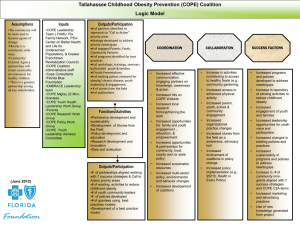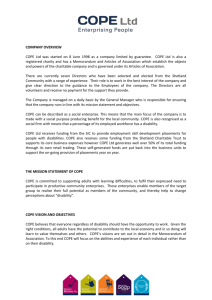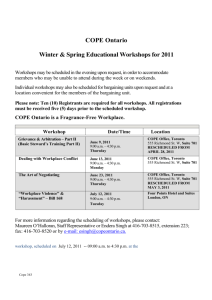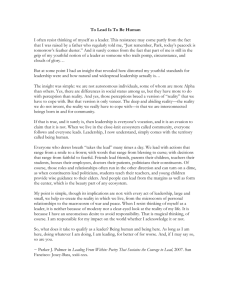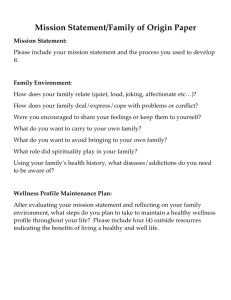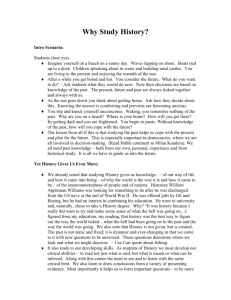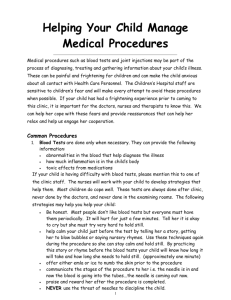MBA 613 Management Accounting
advertisement
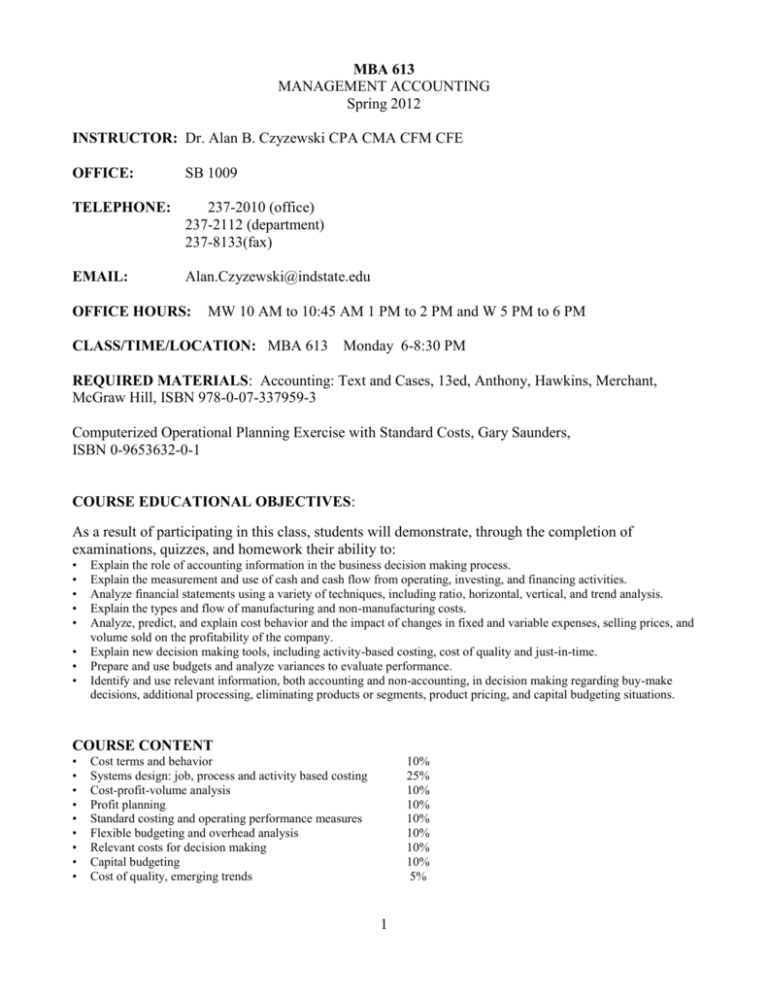
MBA 613 MANAGEMENT ACCOUNTING Spring 2012 INSTRUCTOR: Dr. Alan B. Czyzewski CPA CMA CFM CFE OFFICE: SB 1009 TELEPHONE: 237-2010 (office) 237-2112 (department) 237-8133(fax) EMAIL: Alan.Czyzewski@indstate.edu OFFICE HOURS: MW 10 AM to 10:45 AM 1 PM to 2 PM and W 5 PM to 6 PM CLASS/TIME/LOCATION: MBA 613 Monday 6-8:30 PM REQUIRED MATERIALS: Accounting: Text and Cases, 13ed, Anthony, Hawkins, Merchant, McGraw Hill, ISBN 978-0-07-337959-3 Computerized Operational Planning Exercise with Standard Costs, Gary Saunders, ISBN 0-9653632-0-1 COURSE EDUCATIONAL OBJECTIVES: As a result of participating in this class, students will demonstrate, through the completion of examinations, quizzes, and homework their ability to: • • • • • • • • Explain the role of accounting information in the business decision making process. Explain the measurement and use of cash and cash flow from operating, investing, and financing activities. Analyze financial statements using a variety of techniques, including ratio, horizontal, vertical, and trend analysis. Explain the types and flow of manufacturing and non-manufacturing costs. Analyze, predict, and explain cost behavior and the impact of changes in fixed and variable expenses, selling prices, and volume sold on the profitability of the company. Explain new decision making tools, including activity-based costing, cost of quality and just-in-time. Prepare and use budgets and analyze variances to evaluate performance. Identify and use relevant information, both accounting and non-accounting, in decision making regarding buy-make decisions, additional processing, eliminating products or segments, product pricing, and capital budgeting situations. COURSE CONTENT • • • • • • • • • Cost terms and behavior Systems design: job, process and activity based costing Cost-profit-volume analysis Profit planning Standard costing and operating performance measures Flexible budgeting and overhead analysis Relevant costs for decision making Capital budgeting Cost of quality, emerging trends 10% 25% 10% 10% 10% 10% 10% 10% 5% 1 Course’s Relationship to College of Business Learning Goals Business Practice s Analytical Thinking 1. Students will be knowledgeable about current business practices and concepts. A. Students will understand the functional areas of and interdisciplinary nature of business, and will be able to solve business problems utilizing current theory and practices. . 2. Students will be able to make prudent business decisions by employing analytical and critical thinking. A. Students will demonstrate the ability to solve business problems by applying appropriate decision-making techniques, including defining the problem, collecting appropriate data, identifying alternatives, analyzing information, and interpreting results. . Communicatio n Skills Technology Skills 3. Students will be effective communicators. A. Students will demonstrate the ability to effectively convey information using appropriate means of communication. 4. Students will be competent in applying relevant technology to business problems. A. Students will understand the nature, function and limitations of commonly used business information systems. B. Students will demonstrate proficiency in using technology to solve business problems. . 5. Students will be competent in ethical decision making. Ethical Reasoning Ethical Reaso ning Professiona l Skills Skills A. Students will be able to explain and defend the ethical framework in which they make business decisions. B. Students will be able to identify parties affected by a business decision, identify how a decision may affect each stakeholder, and arrive at a decision that is (ideally) mutually beneficial or one that minimizes harm to any one party. . 6. Students will be able to function effectively in professional settings. A. Students will demonstrate commitment to standards of professional behavior. B. Students will demonstrate an understanding of individual and group dynamics in organizations, including team building and collaborative behavior in the accomplishment of tasks. . Global Awareness 7. Students will be cognizant of the complexities of operating in a global business environment. A. Students will understand the basic economic, political, cultural and operational motivations for international business. 2 VALUATION PROCEDURE: Evaluation will be determined as follows: Points Written case 250 Project Presentation 250 Projects write up 250 Framework 250 -----------------------------------------Total 1000 Grading Scale A+ A AB+ B BC+ C CD+ D DF 970 - 1000 900 - 969 880 - 899 860 – 879 800 – 859 780 – 799 760 -779 700 - 759 680 - 699 660 – 679 600 – 659 580 – 599 579 and below Class Attendance: Full compliance with the Indiana State University undergraduate catalog p. 29. When a student is absent due to illness, written justification must be obtained from the Student Health Services. I expect you to inform me of all anticipated and unanticipated absences so that make-up work can be arranged. You will not be allowed to make up missed work if you fail to contact me prior to returning to class. Any student who misses a class is responsible for obtaining notes from a classmate regarding any changes in assignments, exam dates, material covered, etc. You are responsible for all material and announcements given in class whether you are present or not. 3 Reading and homework policies: 1. Assignments. The Course Schedule and Assignment Sheet provided reflects the amount of material to be covered in the course and the estimated time needed to cover each area. It is only an estimate and is subject to revision. 2. Readings. It will be to your advantage to read each chapter and case before it is discussed in class. You are responsible for material in the text even if it is not discussed in class unless you are specifically told otherwise. TENTATIVE COURSE SCHEDULE AND ASSIGNMENTS MBA 613/Fall 2010 1-11 1-18 1-25 2-1 2-8 2-15 2-22 2-29 3-7 3-14 3-21 3-28 4-4 4-11 4-18 4-25 5-2 Intro to course, COPE, Review Chs.2, 3,5,7,11,14 Review Chs.2, 3,5,7,11,14 and COPE Discuss Ch. 15 and COPE Case 15-1 Discuss Ch. 16 Case 16-1 Discuss Ch. 18 COPE Decision 1 Due Case 18-2 Discuss Ch. 19 COPE Decision 2 Due Case 19-1 Discuss Ch. 20 COPE Decision 3 Due Discuss Ch. 21 COPE Decision 4 Due Holiday Case 21-1 Discuss Ch. 22 COPE Decision 5 Due Case 22-2 Discuss Ch. 24 COPE Decision 6 Due Case 24-1 Discuss Ch. 26 COPE Decision 7 Due Case 26-4 Discuss Ch. 27 COPE Decision 8 Due Case 27-2 COPE Presentations COPE Presentations COPE Presentations 4
